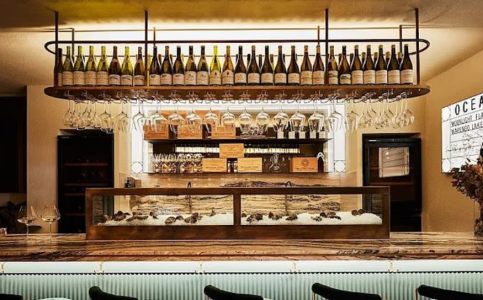Restaurant boss slams own staff before sudden shutdown
By
- Replies 25
It’s not every day you see a business owner take a public swipe at their staff while announcing the closure of their favourite restaurants—but that’s exactly what’s happened for two, and it’s got everyone talking.
This restaurant, which has been serving the freshest oysters and French-inspired fare for three years, will close on 19 July.
Its sister venue, famous for its lobster rolls and champagne, will also close the same weekend.
But as the news of Pearl Chablis and Oyster Bar's closure broke, it wasn’t just the loss of these culinary gems that made headlines.
Owner Jeremy Schinck didn’t hold back in his parting message, laying some of the blame for the closures squarely at the feet of his own staff.
According to Schinck, the post-Covid hospitality landscape has been a tough one, with a shrinking pool of talent and a noticeable dip in work ethic.
'Work ethic after Covid has deteriorated,' he said.
'When you have inconsistencies and restaurants opening and closing, new staff aren’t determined to do well in this job. They think, "Oh, this restaurant’s going to close anyway," or, "I don’t give a damn because I’m studying."'
It’s a sentiment that’s sure to spark debate, especially among those who’ve worked in hospitality or have family members in the industry.
Schinck’s frustration is palpable—he says he’s had to work twice as hard for half the reward, and the high staff turnover has made it impossible to build the kind of team that can help a restaurant thrive.
'They are paid entry-level corporate salaries, but some are behaving like teenagers,' he lamented.
'They aren’t coming on board and thinking, ‘Let’s stay here for five to ten years.’ They are chopping and changing, and this reflects in the business, and over time, that ruins the restaurant’s reputation.'
It’s not just Schinck who feels this way. Others in the industry have echoed his concerns, with one recent retiree saying his employer had started hiring older staff because they were more reliable and had better customer service skills.
'There had been a number of under 30s who did not cut the mustard,' he said, citing frequent sick days, lateness, and long breaks as common issues.
Another event industry worker shared similar frustrations, saying he was leaving the industry because new staff were 'too focused on themselves' and took too many personal and sick days.
'They turn up late, then walk up the road to a cafe as "I need my soy milk latte before I can face the day,"' he said.
'Not turn up for two hours as "I needed a haircut, and I am flat out on the weekend and can’t fit it in."'
Schinck has even called for the industry to consider a tertiary qualification requirement, similar to what’s done in some European countries, to encourage new workers to take the profession more seriously.
But is it fair to blame these closures on the feet of staff? Or is it a symptom of a much bigger problem facing the hospitality industry in Australia?
The pandemic has changed the way we work, socialise, and spend our money. Office workers haven’t returned to the CBD in the same numbers, and the cost of living crisis means many of us are cutting back on dining out.
For restaurant owners, that means tighter margins, unpredictable trade, and a constant battle to keep the doors open.
Pinchy’s co-founder Samara Schinck described the closure as 'deeply emotional,' saying, 'We poured our hearts into creating a space that celebrated great food, genuine hospitality and moments of joy. Unfortunately, the reality is that we can no longer make the restaurant work sustainably in today’s economic climate and at this location.'
It’s a sad end for two much-loved venues, and a stark reminder of the challenges facing the hospitality industry right now.
Whether you agree with Schinck’s assessment or not, there’s no denying that running a restaurant has never been tougher.
 Have you noticed a change in service or staff attitudes when dining out since the pandemic? Do you think the younger generation is less committed to hospitality, or are there bigger issues at play? And for those who’ve worked in the industry, what’s your take on the challenges facing restaurants today? Share your thoughts in the comments below.
Have you noticed a change in service or staff attitudes when dining out since the pandemic? Do you think the younger generation is less committed to hospitality, or are there bigger issues at play? And for those who’ve worked in the industry, what’s your take on the challenges facing restaurants today? Share your thoughts in the comments below.
Read more: Culinary fans express sorrow as iconic restaurant ends nearly a decade-long journey
This restaurant, which has been serving the freshest oysters and French-inspired fare for three years, will close on 19 July.
Its sister venue, famous for its lobster rolls and champagne, will also close the same weekend.
But as the news of Pearl Chablis and Oyster Bar's closure broke, it wasn’t just the loss of these culinary gems that made headlines.
Owner Jeremy Schinck didn’t hold back in his parting message, laying some of the blame for the closures squarely at the feet of his own staff.
According to Schinck, the post-Covid hospitality landscape has been a tough one, with a shrinking pool of talent and a noticeable dip in work ethic.
'Work ethic after Covid has deteriorated,' he said.
'When you have inconsistencies and restaurants opening and closing, new staff aren’t determined to do well in this job. They think, "Oh, this restaurant’s going to close anyway," or, "I don’t give a damn because I’m studying."'
It’s a sentiment that’s sure to spark debate, especially among those who’ve worked in hospitality or have family members in the industry.
Schinck’s frustration is palpable—he says he’s had to work twice as hard for half the reward, and the high staff turnover has made it impossible to build the kind of team that can help a restaurant thrive.
'They are paid entry-level corporate salaries, but some are behaving like teenagers,' he lamented.
'They aren’t coming on board and thinking, ‘Let’s stay here for five to ten years.’ They are chopping and changing, and this reflects in the business, and over time, that ruins the restaurant’s reputation.'
It’s not just Schinck who feels this way. Others in the industry have echoed his concerns, with one recent retiree saying his employer had started hiring older staff because they were more reliable and had better customer service skills.
'There had been a number of under 30s who did not cut the mustard,' he said, citing frequent sick days, lateness, and long breaks as common issues.
Another event industry worker shared similar frustrations, saying he was leaving the industry because new staff were 'too focused on themselves' and took too many personal and sick days.
'They turn up late, then walk up the road to a cafe as "I need my soy milk latte before I can face the day,"' he said.
'Not turn up for two hours as "I needed a haircut, and I am flat out on the weekend and can’t fit it in."'
Schinck has even called for the industry to consider a tertiary qualification requirement, similar to what’s done in some European countries, to encourage new workers to take the profession more seriously.
But is it fair to blame these closures on the feet of staff? Or is it a symptom of a much bigger problem facing the hospitality industry in Australia?
For restaurant owners, that means tighter margins, unpredictable trade, and a constant battle to keep the doors open.
Pinchy’s co-founder Samara Schinck described the closure as 'deeply emotional,' saying, 'We poured our hearts into creating a space that celebrated great food, genuine hospitality and moments of joy. Unfortunately, the reality is that we can no longer make the restaurant work sustainably in today’s economic climate and at this location.'
It’s a sad end for two much-loved venues, and a stark reminder of the challenges facing the hospitality industry right now.
Whether you agree with Schinck’s assessment or not, there’s no denying that running a restaurant has never been tougher.
Key Takeaways
- Two popular Melbourne restaurants, Pearl Chablis and Oyster Bar and Pinchy’s, are set to close, with the owner partly blaming staff’s poor work ethic and high turnover for the shutdown.
- The restaurant owner said that finding quality hospitality staff post-Covid has become tough, with many new workers lacking dedication and reliability, impacting the venues’ reputation.
- Others in the hospitality industry echoed these concerns, saying younger staff often arrived late, took frequent sick days, and didn’t treat the profession seriously.
- Co-owner Samara Schinck described the closures as deeply emotional, citing the inability to operate sustainably in the current economic climate and calling for higher industry standards, such as mandatory tertiary qualifications for new workers.
Read more: Culinary fans express sorrow as iconic restaurant ends nearly a decade-long journey








